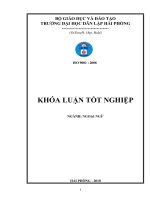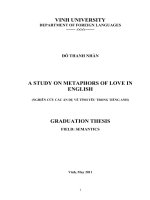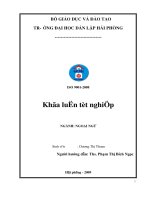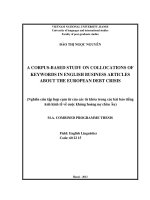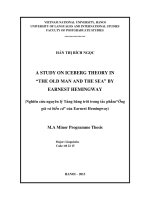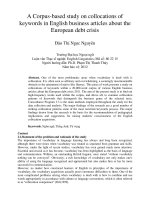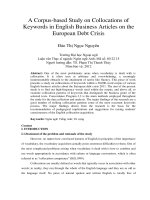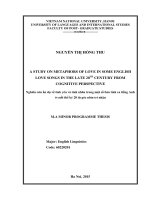A study on clauses of purpose in english and vietnamese=nghiên cứu các mệnh đề chỉ mục đích trong tiếng anh và tiếng việtệnh trong tiếng anh và tiếng việt
Bạn đang xem bản rút gọn của tài liệu. Xem và tải ngay bản đầy đủ của tài liệu tại đây (656.31 KB, 46 trang )
Graduation thesis Nguyễn Thị Bạch Tuyết
Vinh University
Foreign languages department
--------------------------
Graduation thesis
a study on clauses of purpose in English and Vietnamese
( Nghiên cứu các mệnh đề chỉ mục đích trong tiếng Anh vµ tiÕng
ViƯt)
Supervisor : Dr. Ngo Dinh Phuong
Student
: Nguyen Thi Bach Tuyet
Vinh, 2008
A
study on clauses of purpose in English and Vietnamese
1
Graduation thesis Nguyễn Thị Bạch Tuyết
Table of contents
Page
Acknowledgements .................................................................................... i
Table of contents ........................................................................................ ii
Abbreviations ............................................................................................. iv
Part I: Introduction .................................................................... 1
I. Reason for choosing the study............................................................ 1
II. Aims of the study................................................................................ 1
III. Scope of the study .............................................................................. 2
IV. Methods of the study ......................................................................... 2
V. Design of the study ............................................................................ 2
Part II: Content .............................................................................. 3
Chapter I: Theoretical background................................................. 3
1.
Sentence .................................................................................. 3
1.1
Definition of sentence .................................................................. 3
1.2
The classification of sentence ...................................................... 4
1.2.1 Classification of the sentence by structure ................................. 4
1.2.1.1. Simple sentence ................................................................... 4
1.2.1.2. Complex sentence ............................................................... 5
1.2.1.3. Compound sentence ............................................................ 6
1.2.1.4. Compound-complex sentence ............................................. 8
1.2.2. Classification of the sentence by purpose ................................... 9
1.2.2.1. Declarative sentences ............................................................... 10
1.2.2.2. Interrogative sentences ............................................................. 10
1.2.2.3. Imperative sentences ................................................................ 11
A
study on clauses of purpose in English and Vietnamese
2
Graduation thesis Nguyễn Thị Bạch Tuyết
1.2.2.4. Exclamatory sentences ............................................................. 11
2.
Clause ........................................................................................ 12
2.1. Definition of clauses ................................................................. 12
2.2. The classification of clauses ..................................................... 13
2.2.1. Independent clause ......................................................... 14
2.2.2. Dependent clause ........................................................... 14
2.3. Structure of dependent clause ................................................... 16
2.4. Function of dependent clauses .................................................. 17
Chapter II: The study on clauses of purpose
in English and Vietnamese ......................................... 20
2
Clauses of purpose in english.................................................. 20
Expressing of purpose by infinitive .............................................. 20
The infinitive alone: to infinitive........................................................ 20
In order or so as + infinitive with to .................................................. 23
In order(not so as) used by emphasize
that the subject really had this purpose in mind ...................... 25
Infinitive + noun + preposition.......................................................... 26
Infinitives of purpose after go and come ........................................... 26
Expressing of purpose by so that/ for/ in case .............................. 27
Purpose clauses are expressed by
so that + will/ would or can/ could + infinitive ....................... 27
Purpose clauses can also be formed by so that/ in order that +may/
might or shall/ should +
infinitive ....................................................... 28
Negative purpose clauses are made by
putting the auxiliary verb (usually will/ would or should) ...... 29
In case clause .................................................................................... 30
Clauses of purpose with for ............................................................... 34
Some nouns, verbs, phrases express purpose like: aim, goal,
end,
purpose, object, with a view to + V-ing,
with the aim of + V-ing, for the sake of ................................................ 34
A
study on clauses of purpose in English and Vietnamese
3
Graduation thesis Nguyễn Thị Bạch Tuyết
Chapter III Applications to teaching and suggested exercises ..... 38
A. Applications to teaching ..................................................... 38
B.
Suggested exercises............................................................. 39
Part III : Conclusion and reference ................................ 44
Abbreviations
E.g: For example
i.e : That is to say
etc : et cetera
S-V-O: subject - verb – object
A.m : Ante-meridium
P.m : Post-meridium
A
study on clauses of purpose in English and Vietnamese
4
Graduation thesis Nguyễn Thị Bạch Tuyết
Part I
IntroductioN
I. Reason for choosing the subject
English has become an international language, so the demand of
learning is very great. However, it is not easy to master unless you have
real competances of grammar, vocabulary, syntax, etc. Grammar is
considered as an effective means to help you succeed in learning a
language. Adverbial clause of purpose is a type of adverbial clauses‟
system, not only does it exist in English but also in many other languages
not exception in Vietnamese.
Purpose clauses are used popularly in every aspect of language,
example: literature, communication etc. They have many functions which
are correspondent with a lot of different contexts. The author researches
the ways of expressing purpose so that the learners can use in every
contexts.
Each country has its own cultural characteristics. The culture may be
shown by customs, habits, lifestyles, architectures and language well. This
study provides us with knowledge of Vietnamese and English culture
through languages to transfer those clauses correctly from Vietnamese to
English and vice versa.
Finally, being a student of English the author finds it useful to
understand more deeply about clause of purpose in English and
Vietnamese. That is the reason why the author decided to go into this
subject.
A
study on clauses of purpose in English and Vietnamese
5
Graduation thesis Nguyễn Thị Bạch Tuyết
II. Aims of the study
The study aims at widening knowledge of English grammar,
researching the ways of expressing purpose clauses to
help learners
understand and use them correctly. Through the comparison between
purpose clauses English and Vietnamese, the learners can see the relevant
differences between them.
III. Scope of the study
1. The ways of expressing purpose clauses
2. Purpose clauses in Vietnamese and English
3. Applications to teaching and suggested exercises
IV. Method of the study
1. Explanation
2. Translation
3. Comparative
V. Design of the study
This study consists of three parts:
Part I: Introduction
Part II: Content
Content consists of three chapters:
Chapter I: Theoretical background
1. Sentence
2. Clause
Chapter II:
Clauses of purpose in English and Vietnamese
Chapter III: Applications to teaching and suggested exercises
Part III: Conclusion and reference
A
study on clauses of purpose in English and Vietnamese
6
Graduation thesis Nguyễn Thị Bạch Tuyết
Part II
Content
Chapter I
Theoretical Background
1.
Sentence
1.1 Definition of sentence
According to Alice Oshima - Ann Hogue, world publisher, (p.7): “A
sentence is a group of words that you use to communicate your ideas in
writing or in speech. It is a complete, independent unit of thought and
consists of two main parts: a subject and a predicate”.
The predicate is the word or words that names the person, thing, a
place that a sentence is about. It is usually a noun or pronoun. The
predicate makes a statement about the subject. It consists of a verb and its
modifier or complements. The verb is the most important part of the
predicate. It expresses action or a state of being. A complement is a word
or words used to complete the meaning of the verb.
A sentence is the basic unit of written English language
communication. We grant poets, playwrights, and fiction writers some
"literary license." These authors can experiment with the language or use
the language in an unconventional manner. Expository writing is
conveyance of information, often necessary or even vital information, to
readers who need that information. If a reader misinterprets a sentence in a
work of fiction, no harm results. A misinterpretation of nonfiction writing
A
study on clauses of purpose in English and Vietnamese
7
Graduation thesis Nguyễn Thị Bạch Tuyết
can cause harm. Written instructions, policies, procedures, guidelines,
research reports, personal communication, and news media information
need to be written so that the reader understands exactly what the writer
intended.
Eg : “Tomorrow will be a short school day. The school day
will
terminate at 11a.m. The school administrators deliver a carelessly
prepared message to the school bus drivers telling them to be at the school
at 1 p.m”.
1.2
The classification of sentence
1.2.1 Classification of the sentence by structure
In English there are basically four kinds of sentences. One traditional
scheme for classifying English sentence is by the number and types of
finite clauses.
1.2.1.1 Simple sentence
The basic English language sentence is called a simple sentence. It
requires a subject and a verb. We ordinarily include some additional words
that explain the subject. The sentence or a part of a sentence that contains a
subject and a verb and constitutes a complete thought is called an
independent clause.
Eg :
I like English.
(English 10, p.20)
The sentence above conveys a complete thought. The subject is I, and
the verb is like. The word English conveys an understanding of what the
subject likes. The sentence has one independent clause and is a simple
sentence. Observe the arrangement or sequence of sentence components:
subject, verb, other parts of the sentence. This arrangement is not
A
study on clauses of purpose in English and Vietnamese
8
Graduation thesis Nguyễn Thị Bạch Tuyết
mandatory, but sentences written in this format are usually easy to
understand.
1.2.1.2. Complex sentence
A complex sentence contains an independent clause and a subordinate
clause. The independent clause can function as a complete sentence. The
subordinate clause also contains a subject and a verb (in finite clause) or a
form of the verb without subject (in non-finite caluse) but cannot function
as an independent sentence. The dependent clause is introduced with a
subordinator, such as who, because, as, even though, if, so that, etc.
The dependent clause can come at the beginning in the middleposition or end of a complex sentence. When the dependent clause comes
at the beginning, a comma (,) is placed before the independent clause.
In a complex sentence of two related ideas, one idea is generally more
important than the other one. The more important idea is placed in the
independent clause; the less important idea is placed in the dependent
clause.
A complex sentence is formed with:
Independent clause + dependent clause
Dependent clause, + independent clause
Figure 1.1
Eg :
We surveyed the damage as the wind subsided.
We surveyed the damage. This is an independent clause and a
complete sentence. The words convey a complete thought. The words as
the wind subsided form a subordinate clause. The words do not convey an
intelligent thought that can stand alone as a sentence. If we modify as the
wind subsided so that it becomes. The wind subsided, we realize that it
contains both a subject and a verb. The words as the wind subsided
A
study on clauses of purpose in English and Vietnamese
9
Graduation thesis Nguyễn Thị Bạch Tuyết
constitute an adverbial expression that describes a condition that existed
when we surveyed the damage.
In addition, the dependent clause may be in the middle position.
Ex:
- The girl who is sitting over there is my daughter.
Dependent clause
- The car he bought yesterday is a secondhand one.
Dependent clause
1.2.1.3. Compound sentence
A compound sentence contains two independent clauses. Two
independent clauses may be joined by a comma and a conjunction, such as
and, or, nor, for, so, yet, or by a semicolon, or by a colon. Each clause in a
compound sentence must have a subject and a verb, is of equal importance,
and can stand alone. Punctuate the sentence by putting a comma (,) before
the coordinating conjunction.
a.
By a coordinating conjunction:
Eg :
- George has applied for a scholarship, and Diane has requested
financial aid.
(additional idea related to first idea)
- Students may live in the dormitories, or they may live in off-campus
housing.
(choice of two possibilities)
- Ron completed his homework early, so he decided to go to the party.
(result of first clause)
- Foreign students must take English classes, for they must be able to
communicate easily in speaking and writing. (reason for first clause)
- I have taken two finals, yet I must take two more this week.
(contrast to first clause)
- Many students do not like to study for tests, nor do they like to write term
papers.
A
(negative choice in the both clauses)
study on clauses of purpose in English and Vietnamese
10
Graduation thesis Nguyễn Thị Bạch Tuyết
b. By a semicolon:
- We accept the design, it meets our standards.
c. By a colon:
- The school board funded the computer laboratory; consequently,
computer classes will be offered next year.
- The judge has decided the case, and he ruled as follows: "The court
finds the defendant guilty and sentences him to time served". From the
above examples, we have a following structure:
A compound sentence is formed with:
Independent clause + coordinating conjunction
+ independent clause.
Semicolon
Colon
Figure 1.2
The independent clauses of a compound sentence can also be joined
by a sentence connector such as furthermore, however, otherwise and
therefore. Sentence connectors are used frequently in formal writing to
connect long clauses. Punctuate the sentence by placing a semicolon (;)
after the first clause and a comma (,) after the sentence connectors. We can
see the following structure:
A compound sentence is also formed with:
Independent clause; + sentence connector + independent clause
Figure 1.3
The sentence connector used to link the ideas of the two independent
clauses in a compound sentence shows a logical relationship between the
ideas expressed in the second clause. In the following compound sentence,
for example, the first clause expresses an idea about bicycles as a form of
A
study on clauses of purpose in English and Vietnamese
11
Graduation thesis Nguyễn Thị Bạch Tuyết
transportation. The sentence connector furthermore tells the reader that an
additional idea about transportation will be given in the second clause.
Eg :
Some people are using bicycles for transportation;
furthermore, other are joining carpools or taking public vehicles to get to
their destinations.
The following is table of coordinating conjunctions and sentence
connectors that used to form compound sentence.
Coordinating
Sentence connectors
conjunctions
And
Furthermore,
besides,
Meaning
in Additional idea
addition, moreover, also
But, yet
However, nevertheless, still, Contrast idea
in contrast
For
Reason
Or
Otherwise
Choice of two possibilities
So
Consequently, therefore, thus result
accordingly
Nor
negative choice
Figure 1.4
1.2.1.4. Compound-complex sentence
A compound-complex sentence is a combination of two or more
independent clauses and one or more dependent clauses:
Eg :
If students wish to park in campus parking lots, they
must pay for a permit, or the campus police will tag
their cars.
A
study on clauses of purpose in English and Vietnamese
12
Graduation thesis Nguyễn Thị Bạch Tuyết
The readers can write as many independent clauses and subordinate
clauses into a single sentence as your imagination will support. However,
reader comprehension declines as complexity increases.
Sentences can be classified by the number and kind of clauses. They
contain:
Kinds of
sentence
Simple
Number and kind of clauses
One
Examples(subjects underlined
once, verbs twice)
independent Hawks hunt mice
clause(subject or verb or both Hawks and owls hunt mice
may be compound)
Compound
Owls catch mice and eat them
Two or more independent Football is a good game,but I
clauses
Complex
prefer soccer.
One independent clause and The train whistles as it neared the
one
or
more
subordinate tunnel
clauses
independent clause
subordinate
clause
Compound-
Two or more independent Paul ate a sandwich when he got
complex
clauses and one or more home,
subordinate clauses
independent clause subordinate
clause
but he still felt hungry
independent clause
Figure 1.5
In addition, sentences may be classified according to the purpose of the
sentence.
1.2.2 Classification of the sentence by purpose
A declarative sentence is used to make a statement.
A
study on clauses of purpose in English and Vietnamese
13
Graduation thesis Nguyễn Thị Bạch Tuyết
An interrogative sentence is used to pose a question.
An imperative sentence is used to give a command or to implore or
entreat.
An exclamatory sentence is used to express astonishment or extreme
emotion.
Most of the sentences we speak or write are declarative sentences.
1.2.2.1 Declarative sentences
Declarative sentences are the sentences in which the subject is
always present and followed by the verb phrase. A declarative sentence is
the most common type, commonly makes a statement. Discourse function
of declarative is to convey information.
Eg :
-
It's lunch time.
-
We are going to the game on Friday.
-
My car is out of gasoline.
-
We frequently ask questions, perhaps not as frequently
as we should.
1.2.2.2 Interrogative sentences
Interrogative sentences are commonly used by to request
information and is the sentence marked by one or more of these criteria:
The
initial
position
of
an
interrogative
or
WH_element(
WH_question)
Eg :
- What time does the movie start?
- What do you think?
- What are they serving in the cafeteria today?
The replacing of operator is in front of subject
(Yes/No question)
Eg : - Is there a reason why these dirty clothes are in the middle of
A
study on clauses of purpose in English and Vietnamese
14
Graduation thesis Nguyễn Thị Bạch Tuyết
the floor?
- Do you study English?
The rising of question intonation.
Eg : - You are a student?
People who have authority use imperative sentences. Sometimes,
people who don't have authority use imperative sentences. The results may
differ.
1.2.2.3 Imperative sentences
Imperative sentences are ordinarily used to make a demand or
request somebody to do something. An imperative sentence is the sentence
which normally have no overt grammatical subject and whose verb is in
imperative mood.
Eg :
-
Wash the car!
-
Clean up your room!
-
Martin, report to the counselor!
-
Please donate to the community charity fund!
We say that sentences must have a subject and a verb. Note that some
of the above sentences do not seem to have a subject. The subject is
implied, and the implied subject is “you”. “You wash the car”. “You clean
up your room”. “You” is a second person pronoun. It isn't possible to make
a command statement in first person or third person.
1.2.2.4 Exclamatory sentences
Exclamatory sentences are rarely used in expository writing.
Spoken exclamations are often a single word or an incomplete sentence.
Grammarians indicate that formal exclamatory sentences begin with the
word “what” or with the word “how”. Most of the exclamations we
encounter are informal.
A
study on clauses of purpose in English and Vietnamese
15
Graduation thesis Nguyễn Thị Bạch Tuyết
Exclamatory sentences are the sentences which have initial phrase
introduced by WHAT or HOW without inversion of subject and operator.
An exclamatory sentence is generally a more emphatic form of statement.
Discourse function of exclamation is to express the speaker‟s feeling.
Eg : - What a beautiful night!
- How happy we were when the dawn came and our
flag was still there!
- What did you do to your hair!
(exclamation formed as a question)
- I just won 500 dollars!
(exclamation formed as a declarative sentence)
How do you know if a sentence is a question? Well, according to
commedians Bud Abbot and Lou Costello, it depends on the punctuation
mark. For example: "Who's on first."
2.
Clause
2.1 Definition of clauses
Clauses are the principal structure of which sentences are composed.
A sentence may consist of one or more than one clause. According to
Oxford Advanced Learner‟s Dictionary, a clause is” a group of words that
includes a subject and a verb forming a sentence or a part of sentence”.
Eg :
- Tom runs.
- John loves Mary.
In grammar, a clause is a word or group of words ordinarily
consisting of a subject and a predicate, although in some languages and
some types of clauses, the subject may not appear explicitly. (This is
especially common in null subject languages.) The most basic kind of
sentence consists of a single clause; more complicated sentences may
A
study on clauses of purpose in English and Vietnamese
16
Graduation thesis Nguyễn Thị Bạch Tuyết
contain multiple clauses. Indeed, it is possible for one clause to contain
another.
Clauses are often contrasted with phrases. Traditionally, a clause was
said to have both a finite verb and its subject, whereas a phrase either
contained a finite verb but not its subject (in which case it is a verb phrase)
or did not contain a finite verb:
Eg:
"I didn't know that the dog ran through the yard"
In the above sentence, "that the dog ran through the yard" is a clause,
as is the sentence as a whole, while "the yard", "through the yard", "ran
through the yard", and "the dog" are all phrases.
Modern linguists do not draw quite the same distinction, however, the
main difference being that modern linguists accept the idea of a non-finite
clause, a clause that is organized around a non-finite verb.
2.2 The classification of clauses
Clauses are generally classified as either dependent or independent.
An independent clause can stand alone as a complete simple sentence,
whereas a dependent clause must be connected to or part of another clause.
The dependent clause is then described as subordinate to a main clause, or
(if it is part of a larger clause) as embedded in a matrix clause.
Examples in English include the following:
- "I went to the store" (independent)
- "because I went to the store" (dependent)
- "after I went to the store " (dependent)
-“to go to the store" (dependent; non-finite), as in "He wanted me to
go to the store."
- "that I went to" (dependent), as in "That's the store that I went to."
2.2.1 Independent clause
A
study on clauses of purpose in English and Vietnamese
17
Graduation thesis Nguyễn Thị Bạch Tuyết
An independent clause is a group of words that has a subject and
verb. It is used as a part of a sentence but is grammatically independent
and could stand alone.
The following sentences show good examples of independent clauses:
-You will need certain qualification if you choose a career in
(Independent clause)
computer programming.
- When the boys came out, their clothes were not there.
(Independent clause)
- While he was up there he suddenly saw an old man in the street
(Independent clause)
An independent clause is formed with:
Subject + verb + complement
Figure 1.6
2.2.2 Dependent clause
A dependent finite clause is introduced with a subordinator such as
when, when, while, if, or before. It is followed by a subject, verb and
complement. It cannot stand alone because the subordinator signals the
need for an independent clause to complete the meaning of the sentence.
Eg :
- When he comes, I will hug him.
(Dependent clause)
- I will elect someone who I like as a monitor.
(dependent clause)
- When he arrived, he was hot and tired.
(Dependent clause)
Each of the above clauses is dependent since each of them express
only a part of a complete thought and is therefore a fragment (an
A
study on clauses of purpose in English and Vietnamese
18
Graduation thesis Nguyễn Thị Bạch Tuyết
incomplement sentence). In order to form a grammatically complete
sentence, each of the above clauses, must be joined to an independent).
A dependent finite clause is formed with:
Subordinator + subject + verb + complement
Figure 1.7
A dependent non-finite clause is a clause whose V element is a nonfinite verb phrase,can be constructed without a subject. The four classes of
non-finite clause verb phrase serve to distinguish four classes of non-finite
clause:
Infinitive with “to”:
Eg:
- To find a good job is very difficult
Dependent non-finite infinitive clause
Infinitive without “to”:
Eg:
- He makes me clean the floor
Dependent non-finite infinitive clause
- I want to sit down
Dependent non-finite infinitive clause
Ing-clause:
Eg:
- Protecting forest is our duty
Dependent non-finite ing-clause
- I enjoy listening to classical music
Dependent non-finite ing-clause
Ed-clause (can‟t be subject, object, only can be adverbial clause)
Eg:
- Punished by the teacher, she was bored.
Dependent non-finite adverbial clause of reason
Verbless clause is usually subjectless and the verb ommitted is often
the verb “to be”.
A
study on clauses of purpose in English and Vietnamese
19
Graduation thesis Nguyễn Thị Bạch Tuyết
Eg:
- When at school, I was good at maths.
Dependent non-finite adverbial verbless clause of time.
- When necessary, call me
Dependent non-finite adverbial verbless clause of time.
2.3
Structure of dependent clause
The other major way to classify dependent clauses is by their
structure, though even this classification scheme does make some
difference to the clause‟s function in a sentence. This scheme is more
complex, as there are many different ways that a dependent clause can be
structured. In English common structures include:
Many dependent clauses, such as “because they agreed” or “before
they come” consist of a preposition like subordinating conjunction, plus
what would otherwise be an independent clause. These clauses act much
like prepositional phrase, and are either adjective clauses or adverbial
clauses, with many being able to function in either capacity.
Relative clauses, such as “which I couldn’t see”, generally consist of
a relative pronoun, plus a clause in which the relative pronoun plays a part.
Relative clauses usually function as adjective clauses, but occasionally
they function as adverbial clauses; in either case, they modify their relative
pronoun‟s antecedent, and follow the phrase or clause that they modify.
Fused relative clauses, such as “what he did” (in the sense of “the
thing he did”), are like ordinary relative clauses except that they act as
noun clauses, they incorporate their subjects into their relative pronouns.
Declarative content clauses, such as “that they came”, usually consist
of the conjunction that plus what would otherwise be an independent
clause or of an independent clause alone (with an implicit preceding
“that”). For this reason, they are often called “that” clauses.
A
study on clauses of purpose in English and Vietnamese
20
Graduation thesis Nguyễn Thị Bạch Tuyết
Declarative content clauses refer to states of affair; it is often implied
that the state of affair in the case, as in “it is fortunate that they came”, but
this implication is easily removed by the context, as in “it is doubtful that
they came”.
Interrogative content clauses, such as “whether they came” and
“where he went” (as in “I don’t know where he went”) are much like
declarative ones, except that they are introduced by interrogative words.
Rather than referring to a state of affair, such as one of the participants(as
in “I wonder who came”) or even the truth of the state(as in “I wonder
whether he came”).
Small clauses, such as “leave”( as in “I saw him leave”) and “to
leave”(as in “I wanted him to leave”), are minimal predicate structures,
consisting only of an object and an additional structure( usually an
infinitive), with the later being predicated to the former by a controlling
verb or preposition.
(Langacker, RW. (2000). Grammar an conceptualization.)
2.4
Functions of dependent clauses
One major way to classify dependent clauses is by function; that is, by
the roles they play in the clauses they are subordinate to. Since the same
dependent clause might have different roles in different sentences, this
classification must be applied on a per-sentence basis.
Dependent clauses may function as subject, object, complement, or
adverbial in the superordinate clause:
Subject:
Eg:
- That he passed the exam make me surprised.
- To learn well this subject is not easy.
- Listening to music is my favourite.
Direct object:
A
study on clauses of purpose in English and Vietnamese
21
Graduation thesis Nguyễn Thị Bạch Tuyết
-
I know that she is pretty.
-
I decided to take part in English club.
-
I enjoy listening to music.
Direct object:
-
I know that she is pretty.
-
He gives whom he met yersterday a book.
Subject complement:
-
The point is that we’re leaving
-
My question is where you live
-
My great favourite is watching TV.
Object complement:
-
I imagined him overcome with grief
-
They‟ll elect everyone who has ability
-
When we meet, I shall explain everything.
-
When I was a child I like sweet
-
To be honest, I don‟t like you
-
What is more, he has lost the friends he had
-
To conclude, I love you
Adjunct:
Disjunct:
Conjunct:
In addition, they may function within these elements, as postmodifier,
prepositional complement.
Postmodifier in noun phrase:
-
A friend who remains loyal is a real one.
-
The problem to be solved is money.
Prepositional complement:
A
-
It depends on what we decide
-
I‟m interested in what he says
study on clauses of purpose in English and Vietnamese
22
Graduation thesis Nguyễn Thị Bạch Tuyết
Adjectival complement:
-
Ready to act promptly
Under this classification scheme, there are three main types of
dependent clauses: noun clauses, adjective clauses, and adverb clauses, so
called for their syntactic and semantic resemblance to noun phrases,
adjective phrases, and adverbials, respectively. The exact uses of each vary
somewhat from language to language, but a noun clause typically acts as
the subject of a verb or as the object of a verb or preposition, as in these
English examples:
-
"What you say is not as important as how you say it."
-
"I imagine that they're having a good time."
-
"I keep thinking about what happened yesterday."
(Incidentally, note that the word that is actually optional in the second
sentence, highlighting a complication in the entire dependent/independent
contrast: "They're having a good time" is a complete sentence, and
therefore an independent clause, but in "I imagine they're having a good
time", it acts as a dependent clause.)
An adjective clause modifies a noun phrase. In English, adjective
clauses typically come at the end of their noun phrases:
-
"The woman I spoke to said otherwise."
-
"We have to consider the possibility that he's lying to us."
An adverb clause typically modifies its entire main clause. In English,
it usually precedes or follows its main clause:
-
When she gets here, all will be explained.
-
He was annoyed by the whole thing, which was unfortunate,
but unavoidable."
-
A
I always try to help him in order that he will love me.
study on clauses of purpose in English and Vietnamese
23
Graduation thesis Nguyễn Thị Bạch Tuyết
Chapter II
The study on clauses of purpose
in English and Vietnamese
Every language has its own features. The differences among
languages are usually expressed in words, structures, grammatical
categories etc...Both English and Vietnamese are usually called “S-V-O”
language, but in English, the grammatical categories are expressed inside
the word whereas in Vietnamese those are expressed outside the word.
Therefore, in adverbial clause of purpose, English can express purpose of
action, thing and person. Are those expressed in Vietnamese? This is a
question to answer.
2. Clauses of purpose in English and Vietnamese
A clause of purpose is a subordinate clause which explains the
purpose for which the action in the main clause was undertaken. Clauses of
purpose are adjuncts. English has basically two ways to show purpose: (1)
infinitive, sometimes supplemented with “in order”, and (2) a subordinate
clause introduced by “so that” or “in order that”. Let‟s look at the
infinitive showing purpose first.
2. 1 Expressing of purpose by infinitive
Purpose is normally expressed by the infinitive, purpose can be
expressed by:
2.1.1 The infinitive alone: to infinitive
In spoken English, in particular it is much more common simply to
use a to + infinitive without “in order” or “so as” to express the same
meaning.
A
study on clauses of purpose in English and Vietnamese
24
Graduation thesis Nguyễn Thị Bạch Tuyết
The purpose claues in English and Vietnamese express the purpose of
the thing or the action. In English, to emphasize the purpose, the purpose
clauses are often preceded the main clause. In Vietnamese, the main clause
often appear the word thì.
Eg:
In Vietnamese:
In English
Để họ đến kịp giờ thì chúng ta phải đ-a xe đi đón họ.
: To come in time, we must pick up by car.
We use to – infinitive to talk about purpose of action (why someone
does something).
Eg: - I went to the post office to send a letter.
(English 10, p.131)
(Tôi đến b-u điện để gửi mét bøc th-.)
- She telephoned me to invite me to a party.
(Cô ấy gọi điện cho tôi để mời tôi ®Õn dù b÷a tiƯc.)
- The dog has a long nose to smell better.
(Con chó có cái mũi dài để ngửi.)
-
Were having a party to celebrate Ann’s birthday.
(English 10, p.131)
(Chóng t«i đang có bữa tiệc để kỉ niệm ngày sinh của Ann.)
-
We shouted to warn everyone of the danger .
(Chóng t«i la hét lên để báo cho mọi ng-ời biết sự nguy hiÓm.)
Besides, we also use to–infinitive to talk about purpose of something
or someone wants/ uses/ needs something. In Vietnamese it means là để,
để.
Eg:
In English: - This wall is to keep people out of the garden.
In Vietnamese:
(Bức t-ờng này là để ngăn không cho ng-ời khác vào v-ờn).
In English:
A
- The minister has 2 bodyguards to protect him.
study on clauses of purpose in English and Vietnamese
25

